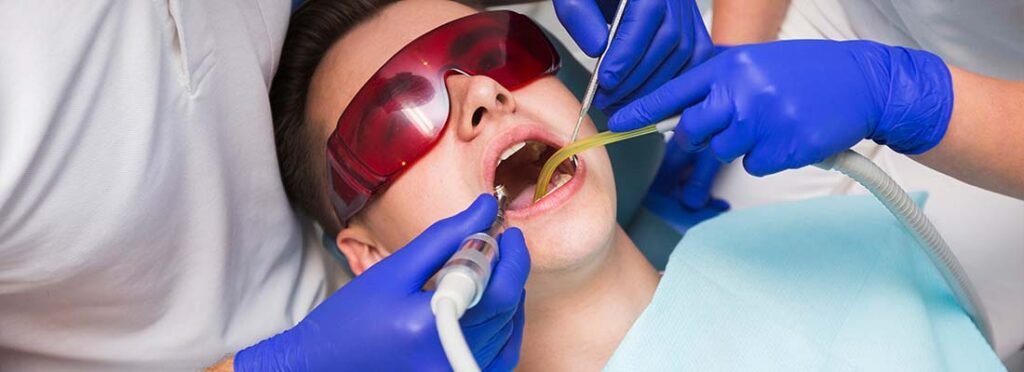Dental Treatment
Most people can avoid toothaches and severe dental problems

Toothache
Toothache or toothache occurs when the nerve located in the root of the tooth is irritated, as well as due to tooth infection, tooth decay, injury, or loss. Pain may also occur after tooth extraction. Also, some pains that arise in places other than the teeth may have an effect on the teeth, such as toothaches. temporomandibular, ear and sinus pain and even some heart problems.

Causes of toothache:
Who among us has not suffered from toothache? Who among us wakes up from sleep due to severe pain? Many people suffer from these severe pains, whether children, adults, or even the elderly. They are not like other pains that go away or improve with time without treatment. Therefore, for our concern, dear reader, for your comfort and health, we will explain to you In this article, the front teeth are covered in detail: To learn how to deal with this pain, as well as its causes and ways to prevent it.

Symptoms of toothache:-
There are many symptoms and signs that indicate the presence of pain in the teeth as well as the jaw, including severe pain when pressing on the teeth, and the pain may last for a period longer than 15 seconds after removing the stimulus, and as the area of inflammation increases, the pain becomes More severe, and the effect of pain may appear in the cheek, ear, or jaw, and other signs and symptoms that may lead you to visit the dentist include the following:
When should you visit the dentist?
You should contact your dentist about a toothache when:
- Pain is not relieved by using painkillers, especially after tooth extraction. This may happen on the second or third day after tooth extraction.
- The pain is related to swollen gums, swelling of the face, or you have discharge around the tooth.
- Broken teeth as a result of injury.
- Wisdom tooth accompanied by pain: Sometimes, the growth of the wisdom tooth causes inflammation of the gums around the visible part of the crown, especially the lower wisdom tooth, and the pain may extend to the jaw and ear, and the patient may also find it difficult to close the mouth and swallow food.
- High temperature. It may indicate the presence of an abscess around some teeth.
- If you experience headache, dizziness, nausea, or vomiting, especially symptoms after an injury to your face or mouth, toothache may be the cause.
- Facial rash associated with toothache.
- Bleeding gums.
How is toothache treated?
When you notice any of the symptoms mentioned above, you should visit the dentist immediately to provide the appropriate methods to eliminate this pain. If there is swelling in the gums or face, or you suffer from a fever, the dentist may prescribe some antibiotics.
The doctor may also fill the teeth if the cause of the pain is tooth decay. This may require extracting the tooth, as well as a nerve filling if necessary by cleaning the nerves and blood vessels, as well as closing the root canals of the tooth. These procedures are done in a manner General in stages, with care for pain and infection, and if the pain is caused by causes other than the teeth or jaw, the dentist will refer you to a specialist.
Methods of preventing toothache:-
Most people can avoid toothaches and severe dental problems through regular dental care by:-
Maintaining a healthy diet:-
Be sure to eat fresh foods that contain all the nutritional elements. A lack of any nutritional elements, especially vitamins such as vitamin B or vitamin C, may lead to some gum diseases, as well as a deficiency of some minerals such as calcium or phosphorus, which may affect It affects the health of teeth and gums and may lead to tooth loss.
Make sure to drink enough water:-
Water contributes greatly to getting rid of food residue stuck in the mouth, and thus prevents the growth of bacteria that threaten the occurrence of gum infections as well as tooth decay. It also contributes to removing bad breath, and it also contains a large percentage of Fluoride, which helps maintain the strength of teeth and protects them from decay.
Brush your teeth after eating.
Establish a good program for brushing your teeth to remove food particles, so be sure to brush your teeth at least twice a day, and also be sure to use a soft toothbrush with a toothpaste rich in fluoride, as recommended by the American Dental Association.
Using floss to clean teeth daily:-
Using floss to clean your teeth helps get rid of food residue stuck between your teeth, which is difficult to get rid of using just a brush.
Use mouthwash:-
Be sure to add the use of mouthwash to your daily dental cleaning routine, as it contributes greatly to killing germs and bacteria present in the mouth that can cause irritation and inflammation of the gums.

